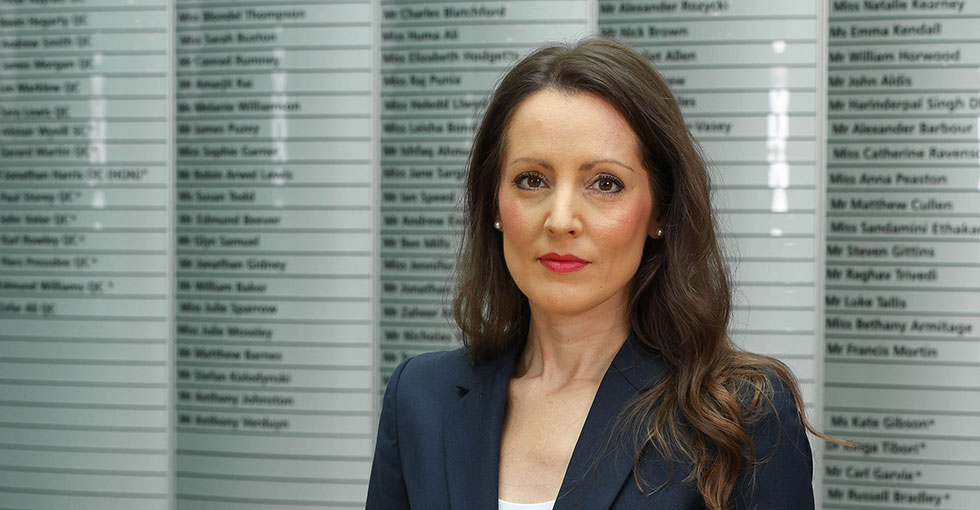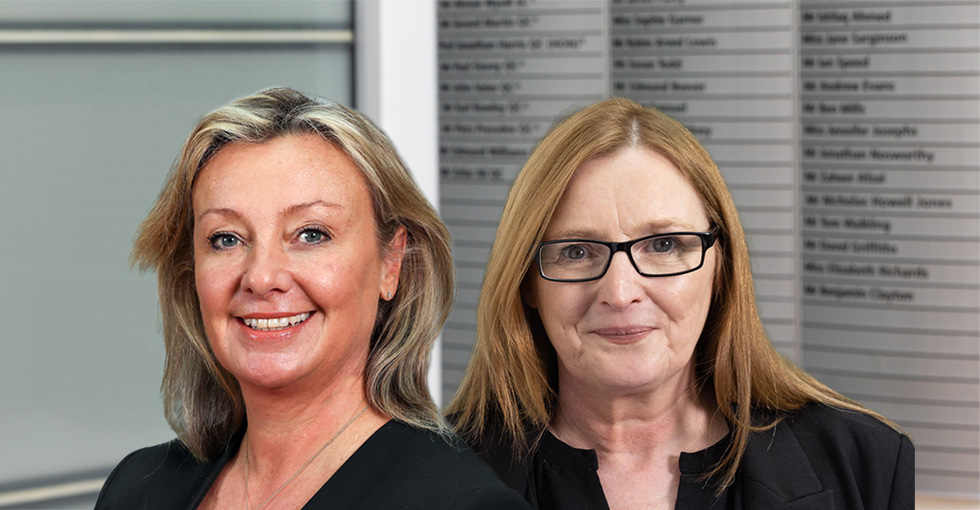With all due respect… remote hearings and family justice; an article by barrister Gemma Bowes.
In an early episode of the drama Peaky Blinders, the viewer is shown a flashback to the arbitrary and spiteful removal of Aunt Polly’s two children by the police and oblique references to the also oblique Board of Guardians. (Soon afterwards, we see the now adult son saying he wants to torch the leafy Birmingham suburb he has been raised in, and, in the absence of ‘letterbox’ or any other ongoing contact, see Polly learn that her daughter died during childhood.)
I do not wish to be glib by referring to a popular culture example. I do wish to highlight that we should not take the existence of a fairly functioning Family Court, deserving of authority and respect, for granted.
In March/April 2020, some hearings did of course continue to take place with physical attendance – and the urgency and value of child protection, combined with access to justice and the reality and constraints of parents’ lives would (should) not have been unknown to anyone routinely working in care proceedings. If attended hearings had have ceased completely, the message that would have gone out to society would have been that courts, and lawyers, and fair process are dispensable. The rapid rollout of remote hearings showed what was possible, although not necessarily desirable. Arguably it also provided a check on the forecasts (such as those of Richard Susskind) of the march of AI and technology within the court system– at least in respect of public child law cases.
The Nuffield Family Justice Observatory undertook research by way of rapid consultation on the use of remote hearings in April 2020, and further consultation in September 2020. Further consultation was undertaken in summer 2021, as requested by the President of the Family Division, to inform post-pandemic recovery plans. Respondents are listed as barristers, solicitors, magistrates, judges, local authority lawyers, parents, social workers, Cafcass, legal advisor (magistrates court) Cafcass Cmyru, advocates, third sector organisations, other relatives, IDVA, other lay parties, and intermediaries. This is a report with detailed quotations of respondents’ views, as well as explanations of caveats and responses broken down in respect of different types of hearings.
HMCTS also published its Evaluation of remote hearings during the COVID 19 pandemic report in December 2021. The respondents were not limited to those involved with the Family Court.
Following the government announcement of the planned removal of covid restrictions including the requirement to self-isolate from 24 February 2022, the message from the President was:
“Subject to any other direction the first hearing notice for any applications issued in the Family Division after 1 March 2022 will be listed as an attended hearing. The court will consider any requests made in an individual case for any change in the format of the hearing bearing in mind the interests of justice. The format of any hearing after the first hearing will be subject to the direction of the judge.”
Further explanation from the FLBA included that:
“From 1 March 2022 the first hearing notice for any applications issued in the Family Division after that date in the RCJ only will be listed as an attended hearing. This is a change from the default position utilised during the pandemic. This message does not impact the current arrangements in place at family courts other than the RCJ. The format of any hearing will be subject to the direction of the judge.”
In October 2021, the President in his Interesting Times speech included his views on the future of remote hearings. He explained his resistance to date to issue national guidance or practice direction, and it remained his “firm view that the circumstances around each case and each local court centre will vary to such a degree that any firm ‘black-letter’ direction or guidance would be inappropriate.” The primary reason being that the decision as to the format for each hearing should be taken by the judge in charge of the case. Second factor among others being geographical – whether it is necessary or proportionate to conduct an in person hearing, or a remote one, may well vary depending upon the distance from court, availability of public transport and other factors.
Rather, he described offering “a steer, and to describe the general direction of travel which courts should expect to follow.”
“The central theme running through the approach that should apply is that the parties and their lawyers should normally be physically present at court on those occasions when an important decision may be taken.
There are a number of positives about remote hearings, but one clear negative is the absence of that time outside court, in the 45 minutes or so before a hearing, when the presence of ‘the court door’ and the proximity of the other parties and their lawyers will not infrequently lead to a focussing of issues or even settlement. That time and space simply does not exist before a remote hearing and it is important that this valuable opportunity for advice, negotiation and possible settlement is regained. Further, it is clear that, at least some lay parties afford less respect to the court process, and the outcome of it in terms of any order, when the hearing is online or by phone. The use of remote attendance is not necessarily more efficient and quicker and it is possible to process more cases at court than it is to do so remotely. More generally, the obvious benefits of an attended, in court, process before a judge or magistrate makes an important decision in a family case do not need to be stated. Remote platforms are good for undertaking transactional communications, but there is more to a Family Court hearing than simply transacting business. Much that goes on has a ‘human’ perspective, which can often be lost online, but is fully present in a court room.
We need to continue to embrace the technology and to use it, for the right hearings, to the full. There are clear detriments to attended hearings in terms of travel time and the inability to attend to other cases at other centres during the extended time needed for physical attendance. There are also unwelcome collateral consequences in terms of additional expense, carbon footprint and other factors. Part of my message is, therefore, that remote hearings, for the right case, are here to stay.
A balance has to be struck in each case, but generally that balance should come down in favour of the parties and their lawyers attending all hearings where an important decision in the case may be taken.
In public law children cases, the hearings where an important decision may be made are likely to include the first CMH, ICO hearings, the IRH and final hearings.”
Clearly the Nuffield report had been influential. In the ‘Key findings’ section under ‘Could remote hearings continue?’:
“Majority of professional respondents saw a continuing role for certain types of remote hearing, although many felt that the decision should be made on a case-by-case basis. The main considerations respondents identified as relevant to such a decision were the vulnerability of lay parties and their wishes and views, the complexity of the case, and whether there was access to suitable technology for all those taking part. There were particular concerns about the use of remote hearings where intermediaries were required. There were many concerns about the challenges of managing remote hearings where interpreters were required and many concerns about the challenges facing litigants in person.
Overall, there was support for remote ‘administrative’ hearings (subject to certain caveats) such as case management hearings, first dispute resolution appointments and also first initial and/or ex parte applications for non-molestation/occupation orders. There was much less support for remote fact-finding hearings, hearings involving contested applications for interim care or contact orders, or final hearings.
Many barristers, solicitors, local authority lawyers, social workers, Cafcass and Cafcass Cymru advisors and guardians highlighted the positive impact of remote hearings on their time and working patterns.” [p2-3]
It is possible that the addition of the first case management hearing to the list of hearings where an important decision may be made relates to other contemporary issues of delay and use of experts.
Also in Key Findings with respect to ‘Ensuring remote hearings work fairly and smoothly’:
“A majority of professionals (63%) felt that more needed to be done to ensure that remote hearings were fair and worked smoothly. Some professional respondents commented that remote hearings would always be inferior to hearings in person. A majority of parents (83%) indicated that they had concerns about how their case was dealt with.” [p3-4]
While some of those concerns are concerns that relate to the justice system generally, for example, concerns asserted with regard to lack of understanding of coercive control etc., such concerns and grievances with a hearing outcome can gain more traction when the method of hearing can also be used as an issue. This is in addition to the concerns that relate specifically to remote hearings.
In considering the question of whether remote hearings could continue, the report identified the most common benefits and disadvantages reported by professional respondents. Benefits reported include: increased efficiency/timeslots; easier to attend; work-life balance; less intimidating for lay parties. Disadvantages reported include: some felt inherently unfair; importance and gravity of decisions being made and being present in court viewed as proportionate to the importance of family law; concern about the loss of the ‘gravitas’ of the court; non-verbal communication is compromised; equal access to and proficiency using technology always a problem; harder for parents to engage with legal representatives online; remote hearings less likely to promote conciliation and could be a barrier to negotiation and discussion; concern about the privacy and safety of some hearings – including when children were in the room or home with parents, parties attending hearings from public spaces or with other people nearby; some professionals raised concerns about who is best served by remote hearings – convenient for barristers, solicitors, Cafcass and social workers, and that this may be prioritised above the needs of lay parties; and many parents who responded to the consultation reported feeling disadvantaged by remote hearings. [p11-14]
For professionals who have become accustomed to working within the system day in day out, perhaps a magistrate’s response in respect of the technology is most striking:
“’I experience problems every time. IT support – it’s amateurish that we have no one to call on when CVP doesn’t work…I estimate that the first 10-15 mins of every remote hearing is spent dealing with technical issues. If you have 6 one-hour hearings that’s 1[and a] ½ hours lost. I’m tired of having no breaks on such days and being exhausted by the end of the day.’” [p41]
There was exploration of views as to causes of delay. Responses included the blunt and frustrated:
“’Pressure on the system is now at breaking point. Social workers in social services and Cafcass are burnt out without any respite likely. Goodwill among professionals which is what the family court system has expected and relied on for many years, is now entirely exhausted. None of these surveys seem to comprehend the scale of the problems. There is instead just a tendency to tinker at the edges, whereas fundamental reappraisal is required’ (Circuit judge).” [p42]
However, as to whether remote hearings had caused delay or were a route out of the backlog, views were mixed:
“Respondents also noted that listing had been adversely impacted by the use of remote and hybrid hearings in cases and for hearings where this was not appropriate, taking into account evidence requirements and circumstances of the parties.” [p43]
One respondent said: “’The use of telephone for all interim hearings (Save for contested ICO) has prevented the judge from successfully narrowing the issues. Everything therefore is contested where some cases many have settled in the past’ (Barrister).” [p43].
There were also responses to the effect that if the Ministry of Justice is prepared to pay recorders/DDJs to sit remotely, this could reduce the backlog of cases.
Obviously the cases would have to be carefully selected, which is where ‘flexibility’ must come in.
The report considered maintaining the authority of the court in remote hearings. Perhaps of significant interest are the responses that indicate concern not just with parents’ attitude/presentation in remote hearings, but of the bench and social work professionals.
“Professionals and lay parties were concerned that remote hearings were detracting from the authority of the court and making it harder for lay parties to take the proceedings and the outcomes sufficiently seriously. This was an issue raised in answer to several of the questions about specific types of hearing.
‘Ensure people know how they should use personal devices in a hearing. The last one I did the lady was sitting in bed with her mobile phone and it was impossible. The one before that the man was sitting in his care with his 8-year-old son in the passenger seat. We had to ask him to ask his son to get out of the car’ (Magistrate).
‘We’ll still got people lurking unseen in the background (or parties sitting in front of the camera in pyjamas with a cigarette and a mug of coffee (last week’s father)) whatever we do’ (Magistrate).
‘Lack of respect by the magistrates regarding court formalities and the need for preparation. One admitting they were not ‘familiar’ with Teams resulting in technical issues and delay in starting the hearing. Another magistrate was dressed inappropriately with tattoos visible and proceeded to take a phone call whilst the hearing was stood down [while] the microphone was on and had to be chastised by the legal advisor’ (Mother).
‘Social workers need to take remote hearings seriously. Their lackadaisical attitude and appearance impacts on the dignity of the court’ (Barrister).” [p62-63]
The HMCTS report identified that a greater proportion of the judiciary were concerned about attitude/behaviour in remote hearings than legal representatives.
“Legal representatives were less likely to consider that there was a difference in public users’ attitudes or behaviour in remote hearings compared to judges and HMCTS staff (36% compared with 61% and 67% respectively). A reduction in formality was the most significant change observed by all professional groups. Reductions in perceived levels of concentration and respectfulness were also commonly observed by professional respondents whilst punctuality was considered to be a less significant issue for those attending remote hearings.” [p18]
“’Even advocates, they dress in a way they wouldn’t dream of dressing coming to the courtroom. And language is more sloppy than it would be in a court room. Same for lay people. If they are on a sofa in a sitting room it is harder to be engaged in a formal/business like way.’ [Judge, Civil]” [p71]
“’[There was an] informality to video hearings that doesn’t exist in court. It should be a sombre procedure with everyone realising it is dignified and serious. Being in court automatically conveys that. Defendants in prison in particular; people walking around, clanging keys, prison video link room is next to cleaner lunchroom with Magic FM playing. Barristers not robed. IT undermines seriousness of situation.’ [Judge, Criminal]” [p.71-72]
The HMCTS research found that in answer to the question whether remote hearings are an acceptable alternative to in-person hearings during the pandemic, 84% judiciary agreed, 93% legal representatives agreed, and 87% court and tribunal staff agreed. In contrast, in answer to the question whether remote hearings are an acceptable alternative to in-person hearings beyond the pandemic 49% judiciary agreed, 77% legal representatives agreed, and 59% of court and tribunal staff agreed. [p77/96]. Further:
“Four-fifths of legal representatives (78%) stated their preference during the pandemic was to work from their home and three-fifths (59%) said they would still prefer to work from home post pandemic.” [p14].
However, while there might be an honesty about preferences – and who of us wouldn’t want to have an extra hour’s sleep and a civilised breakfast at home rather than embarking on a 4 hour round trip to court – there is also clearly a feeling that some things are too significant/problematic to conduct remotely:
“Judges and other professionals felt that more complex cases and those with potentially life altering outcomes, like custodial sentences and child custody decisions, were less appropriate to be conducted remotely.” [p80]
As a judge quoted put it: “We are dealing with parents in the lower socio-economic levels of society, and they don’t have fancy computers and are not capable of sitting at home on one device and talking with legal advisors on other devices. It isn’t inclusive if they don’t attend in-person and is not fair where the stakes are so high for them and their children.” [p57]
Remote hearings, for the right case, are here to stay. But if we don’t have parties and their lawyers, by default, attending all hearings where an important decision in the case may be taken, not only is it structurally unfair, but arguably it contributes to the diminishing of the value of the Family Court. For those watching at home on their smartphones (that is, if they have them and sufficient connectivity) they may become little more than a ‘spectator’ [p16 Nuffield]. If that doesn’t marginalise lay parties for whom the decision means so much and/or fuel the fire of disillusionment if the decision does not go their way, it could alternatively provide some sort of passive channel-flicking/web-browsing feeling on the same device used to speak to mates and watch you-tube clips on the sofa or in the car while smoking a spliff. Family proceedings concerning the safety and welfare of children must surely be important enough to require a party (with the caveats that have long been in place with regards applications for attendance to be excused as appropriate) to take some time out of their day to actually attend court. For such serious matters, at such key moments, and while we still have regard to Articles 6 & 8, the place of a lawyer is alongside parties.










